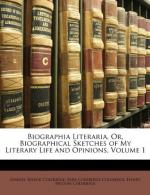
|
| Name: _________________________ | Period: ___________________ |
This test consists of 15 multiple choice questions and 5 short answer questions.
Multiple Choice Questions
1. Which thesis is described as an act of self-consciousness as a source of knowledge?
(a) Thesis II.
(b) Thesis III.
(c) Thesis X.
(d) Thesis I.
2. What kind of poet does Coleridge say conveys trivial thoughts?
(a) Old poets.
(b) Modern poets.
(c) Sanctimonious poets.
(d) Good poets.
3. What religion does Coleridge say he observes?
(a) Catholic.
(b) Unitarian.
(c) Muslim.
(d) Christian.
4. What does Coleridge say appropriateness is an issue in?
(a) Manners.
(b) Poetry.
(c) Grammar.
(d) Daily life.
5. Coleridge says that Samuel Daniel's work shows no mark of which of the following?
(a) Faith.
(b) Style.
(c) Time.
(d) Context.
6. Coleridge states the idea of God involves which of the following?
(a) A realist.
(b) Ignorance.
(c) An optimist.
(d) A pessimist.
7. What study has Coleridge always wanted to see done?
(a) Study of fantastic and natural language.
(b) Study of his own works.
(c) Study of syntax and diction.
(d) Study of Wordsworth's works.
8. Which thesis states that the truth must not be conditional?
(a) Thesis III.
(b) Thesis II.
(c) Thesis IV.
(d) Thesis X.
9. According to Coleridge, who has the most quotable lines?
(a) Milton.
(b) Southey.
(c) Wordsworth.
(d) Byron.
10. Coleridge says that he often disagreed with Wordsorth, but always interpreted his words in which way?
(a) Naively.
(b) Ignorantly.
(c) Wrong.
(d) Right.
11. Which thesis states that truth must have corresponding reality?
(a) Thesis I.
(b) Thesis X.
(c) Thesis II.
(d) Thesis V.
12. Which of the following writers does Coleridge attribute rhyme and meter to?
(a) Gellert.
(b) Faulkner.
(c) Shakespeare.
(d) Milton.
13. What does Coleridge say meter originates from?
(a) Diction.
(b) Balance.
(c) Truth.
(d) Metaphor.
14. What was the first attack that Coleridge made against?
(a) Calvinism.
(b) Catholcism.
(c) Christianity.
(d) England.
15. According to Coleridge, what is the cornerstone of morality?
(a) Love.
(b) Poetry.
(c) Calvinism.
(d) Religion.
Short Answer Questions
1. What was the name of Wordsworth's experimental poem?
2. How does Coleridge describe the idea of poetry?
3. Coleridge finds that quotable lines are known as such for which reason?
4. Whose theory of style does Coleridge say it is to use everyday language?
5. Wordsworth's brilliance overcomes which of the following, according to Coleridge?
|
This section contains 326 words (approx. 2 pages at 300 words per page) |

|




